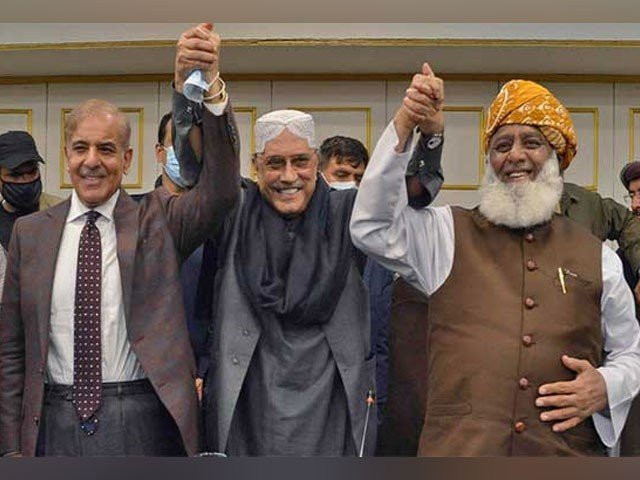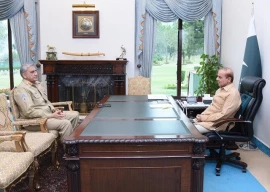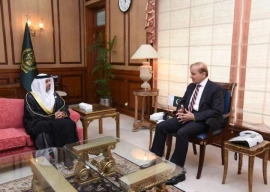
Now that the government has finally cobbled up a heteroclite federal cabinet comprising members from its ‘rainbow coalition’, the terrain ahead for Prime Minister Shehbaz Sharif’s government is thorny and rough.
At a time when the air is thick with anticipations that the country stood just “inches away” from civil unrest, the question that now screams for answers is whether the coalition government will be able to juggle its priorities.
Besides healing the stalled economy back to health, the federal government faces the task of cooling off the boiling narrative of Imran Khan at least to a simmer and, more importantly, maintaining a cordial relationship with the military establishment.
“The biggest challenge for the government is handling the economy, particularly inflation and mounting current account,” political analyst Zaigham Khan said, adding it needs to go back to the IMF and must rationalize petroleum prices that may have an inflationary impact and political cost as well.
Though Imran Khan has left a huge mess for the new government to handle and he will continue to make their job more difficult, Zaigham, who is an anthropologist and development professional, said, no government wants to make difficult decisions when elections stare them in the fact, but the new government has no way to avoid these actions.
Pakistan Institute of Legislative Development and Transparency (PILDAT) Ahmed Bilal Mehboob agreed that the economy is in a terrible state, saying the government is under pressure not to increase the prices of petroleum despite the fact that it is paying hefty subsidies on these, which can’t be afforded. “Dealing with IMF, FATF in this context is included in the challenges,” the PILDAT president said, “seeking inevitable foreign assistance will also be a challenge.”
Maintaining a cordial relationship with the military establishments has always been a challenge for each government, Mehboob said, adding this government has started facing the heat after a recent operation in Balochistan and protests by one of its allies BNP-M. “How will the Govt balance the two is a key challenge,” he said.
Fractious coalition
On the non-inclusion of BNP-M and ANP in the cabinet, Zaigham said that managing coalition governments are always a challenge. However, he said, since this coalition has been formed with narrow objectives and for a limited time, the challenge may not be that hard.
“BNP cannot have too many expectations from a government that is in business for a short time,” Zaigham said, saying it has worked with these political parties before and may feel a lot more comfortable engaging with them relative to the PTI. The same is true for the ANP, he said as “ANP’s biggest foe is PTI and they have political reasons for staying in the coalition till elections are called.”
Commenting on the fractious coalition, Mehboob, however, said that management of an unwieldy coalition government consisting of 13 political parties & some heavy-weight independents is not going to be easy in future as the delay in the formation of the cabinet and disillusionment of BNP-M indicates.
“It will be very difficult to keep all 13 parties in good humour and soon one or the other party will part ways,” Mehboob predicted, saying “it will be extremely difficult to continue for the renaming full term of 16 months.”
Pointing out that the coalition was slow in countering the aggressive & apparently effective narrative of Imran Khan, Mehboob said that the coalition needed to quickly develop a counter-narrative and effectively communicate to the public, especially, keeping in line with the PTI foreign funding case which is expected to be concluded soon by the Election Commission of Pakistan (ECP).
“If PTI is found to be foreign-funded party; making a declaration & referring the case to Supreme Court; pleading for possible dissolution and facing the possible reaction are also the associated challenges,” he added.
Timing of new elections
The parties in coalition governments will determine the time for new elections based on a political calculation, Zaigham said. If they think that they can improve the situation of the economy in a year or year-and-a-half, he said, they may linger on.
“They may also think that some time is needed to blunt Imran Khan’s new narrative and for the early reaction to go away,” he said, saying last year’s patronage and funds to legislators always play important role in elections and the government will keep that in mind as well.
“Making a successful transition towards next general election is another challenge because the ultimate political resolution will come thru election,” Mehboob incorporated. The coalition seems to be divided between an early election camp and full-term camp, he said. However, he maintained, it appears that all this government has been about six months after which it should dissolve the assembly and call for a fresh election.
He said that the six-month prediction was based on ECP’s statement that it is not in a position to go for election before seven months. “Will the federal coalition Govt be able to convince provincial Govts to dissolve their assemblies too to go for a general election for NA and PAs at the same time,” he questioned while commenting that it is “difficult to predict.”





















COMMENTS (1)
Comments are moderated and generally will be posted if they are on-topic and not abusive.
For more information, please see our Comments FAQ